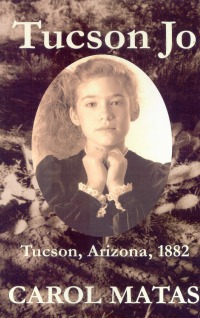| ________________
CM . . .
. Volume XXI Number 4 . . . . September 26, 2014
excerpt:
Carol Matas's historical novel, Tucson Jo, is about father-daughter conflict, women's struggle for equality and the Wild West, subjects guaranteed to stir the imaginations of readers in their "tweens" or early teens. The novel is full of action scenes. Jo has spirited arguments with her Papa, races on horseback with her boyfriend, averts a bank robbery, encourages her siblings to heckle at an election rally, knocks a gun out of a harasser's hand, and, with the other passengers, hits the floor of a train when, outside, Wyatt Earp and his fellow lawmen scare off the Clanton gang and kill outlaw Frank Stilwell. The year is 1882, and 14-year-old Josephine Fiedler has recently moved with her parents and siblings, Isaac and Mabel, from staid Boston to the raw western town of Tucson, Arizona, where the dry climate may help her father's lung problems. He manages a department store, and her mother does charity work and hosts musical and book club evenings with other Jewish ladies in town. The Fiedlers are on easy terms with other families, including their neighbours the Ryans. Mr Ryan is a wealthy saloon owner with a large house and a corral of horses. The children of both families move freely in and out of each other's homes, and the eldest son, Connie, is teaching Jo to ride. Jo finds the long skirts and petticoats of the 1880s restrictive, and she hates riding sidesaddle. When she borrows a pair of her brother's trousers and wears them around the house, her father disapproves. Jo's many ambitions and discontentments are typical of a 14-year-old. She wishes that her father would teach Hebrew to her as well as to her brother, Isaac, and fears her education will be limited to "music, needlepoint and reading". In fact, unlike many girls her age in Tucson, she attends the local public school. She calls her father a "tyrant", but it is clear to the reader that he is not. Mr. Fiedler decides to run for mayor of Tucson because it needs "a sense of propriety, decorum and a civilizing influence". He intends to "do away with the bawdy houses that proliferate on Main Street". He tells Jo that women wearing trousers will not "contribute to the dignity" of the town. His specific plans include a ban on guns in public within the city limits (except for the sheriff and deputie)s; a water supply; a fire department and a public library. The plot thickens when Mr. Ryan joins the race, running a campaign of anti-Semitism, public humiliation and dirty tricks. As disillusioned Connie tells Jo, "Your pa seems to care about the town and wants to do what's best for everyone. My pa cares about this family and his business and making money, and if it's good for him, well, that's all that matters." Readers cheering for the side of integrity and good government will not be disappointed. The wearing apparel issue is solved at the end with a compromise. Over the course of the novel, Jo learns much about the balance between individual freedom and the good of society as a whole. In her “Afterword”, the author explains that the fictional Mr. Fiedler is based upon the real life Charles Strauss (1840-1892) who was the first Jewish mayor of Tucson (1882-4) and who instituted many civic reforms and improvements. He had a distinguished career, later serving as superintendent of public instruction for the Arizona territory from 1887 to 1890. The real life Mr. Strauss and his wife had five children, perhaps one like the fictional Jo. Matas also notes in the “Afterword” that Charles Strauss passed a city ordinance, Ordinance 44, on April 19, 1883, which stipulated: "If any person shall appear... in a dress not belonging to his or her sex... such person shall be deemed guilty of having committed a misdemeanour." The penalty was a fine of up to $300 or jail for up to six months. In her “Epilogue”, the author tells briefly what her characters went on to achieve in life. Fans will look forward to a sequel. Recommended. Information about Ruth Latta's books, including the young adult novel, The Songcatcher and Me, is available at http://ruthlattabooks.blogspot.com.
To comment on this title or this review, send mail to cm@umanitoba.ca.
Copyright © the Manitoba Library Association. Reproduction for personal use is permitted only if this copyright notice is maintained. Any
other reproduction is prohibited without permission.
CM Home | Next Review | Table of Contents for This Issue - September 26, 2014 | Back Issues | Search | CM Archive | Profiles Archive |
